

 |
 |
 |
 |
 |
 |
 |
 |
|||||||
|
||||||||
|
Jack
Bruce 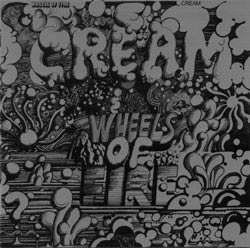 The Wheels of Fire studio LP is rightly celebrated. Again with Tom Dowd's technical assistance and Felix Pappalardi's production (and various instrumental contributions), the album contains such Bruce-penned Cream classics as White Room and Politician, while his instrumental performance on bass shows his style (and sound) to be fully developed. Two songs he wrote for the album appear to be almost like a preview of his solo career: the group-performed Deserted Cities Of The Heart and the almost-solo (only Baker on high-hat), beautifully orchestrated ballad As You Said, a song that has been covered in "avant-garde" circles - check Curlew's (vocal) version on Bee (1991) and Jack Vees's overdubbed solo bass version on The Restaurant Behind The Pier (2000). 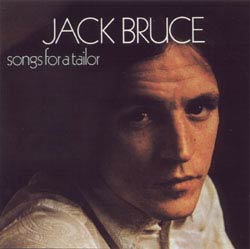 After Cream had split Bruce was asked to assemble a sound-alike rock band. He refused. Having already recorded the Things We Like album, he started working on his first solo album of songs. Produced by Felix Pappalardi, Songs For A Tailor (1969) is a masterpiece, sporting a variety of styles that's simply mind boggling. In fact, it's not easy at first to notice that the album is pretty short - this being also true of all the individual songs - since the sheer variety of styles on the album and the internal variety of the songs themselves make for a very rich experience. From the sides-opening, exuberant, horn-assisted Never Tell Your Mother She's Out Of Tune and The Ministry Of Bag, to the cello ballad Rope Ladder To The Moon, to the double vocal melodies of Boston Ball Game, 1967, to the complex - but very natural-sounding - Tickets To Waterfalls, He The Richmond and Weird Of Hermiston, all is a joy. This was the only Bruce album that charted, and in a way it's not too difficult to see way: his songs were (are) totally unsuitable for mass consumption - they're too intense, too rich, too unconventional. Only the (incredibly beautiful) Theme For An Imaginary Western can be considered "accessible" - in fact, at the time it was covered by a few artists. High praises go to drummers Jon Hiseman and John Marshall, guitarist Chris Spedding and to Bruce's deeply felt vocals, his piano, organ, cello and - of course! - bass. True to his restless artistic nature, at this point in his career Bruce made some very courageous moves: first he joined the highly experimental, highly praised, highly uncommercial Tony Williams Lifetime (Turn It Over, 1970); then he recorded bass and vocal parts for Escalator Over The Hill, Carla Bley's "jazz opera"; then he toured with a quartet featuring former Hendrix drummer Mitch Mitchell and jazz guitarist Larry Coryell. Then he went into the studio to record his masterpiece. 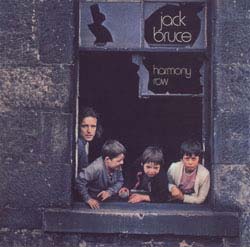 Harmony Row (1971) offers the same highly original qualities of Songs For A Tailor, but has a definite feel of unity, of being a song cycle, that its predecessor lacked. For this album Bruce used only two other musicians: drummer John Marshall (from Nucleus, a group Bruce had performed with in a live setting, and a future member of Soft Machine); and (from Nucleus, and a session man - and future John Cale right-hand man) Chris Spedding on electric and acoustic guitars. Marshall's contribution is versatile and definitely appropriate, but it's Spedding's original approach to the instrument - deceptively simple, sometimes with an air of not-being-quite-sure of what to play - that proves to be a winning card. Bruce's (overdubbed, highly contrapuntal) bass playing is absolutely superb, his background vocals a brand-new resource. And his work on piano and Hammond organ sounds more personal - and very clearly recorded. It's really difficult to single out individual tracks. Folk Song is delicate and intimate; Victoria Sage (listen to the Hammond!) one of his best compositions ever; A Letter Of Thanks and You Burned The Tables On Me are jerky, angular affairs; and what about Post War, Morning Story or Smiles And Grins? (Just listen to the latter's majestic coda!) 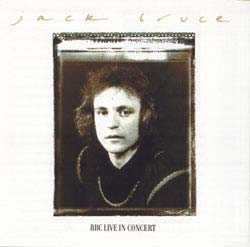 Time to hit the road. Bruce retained Marshall and Spedding, added Graham Bond - his former employer - on piano, organ and occasional sax, plus tenor player Art Theman. In 1995 Windsong released a BBC concert, recorded at the Paris Theatre in London (but not in 1977, as stated on the CD booklet!). The recording quality is more than adequate, while the performance is very, very good - and one can listen to Bruce playing and singing at the same time. Four numbers from Harmony Row, We're Going Wrong from Disraeli Gears, The Clearout from Songs For A Tailor. There's also a nice jamming number, Powerhouse Sod. Required listening. At this point Bruce confused just everybody by starting West, Bruce & Laing with two former members of Mountain, the US sub-Cream. Their two studio LPs - Why Dontcha (1972) and Whatever Turns You On (1973) - are good if not great, but the latter features two excellent Bruce compositions: November Song and Like A Plate. Then he recorded most of the bass parts for Berlin, Lou Reed's masterpiece. In 1974 he was extensively featured as a vocalist on No Answer, Michael Mantler's (Carla Bley's then-husband) dramatic, introverted, extremely intense work based on a poem by Samuel Beckett. Then, a guest spot on the title-track of Frank Zappa's Apostrophe ('). And then, it was solo time again. 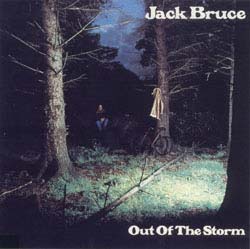 At the time of its release (1974) not too many people bothered to listen to Out Of The Storm - maybe to some the West, Bruce & Laing affair had looked like too much of a concession to commercialism? Their loss, really. Sure, the album is not as perfect as Harmony Row. But its more streamlined, polished surface hides quite a complicated structure. On guitars, Steve Hunter (off Lou Reed's live band) has too much of a "professional" approach, but he plays what's needed. Jim Keltner is the drummer on most tracks, and his famously reliable timekeeping proves to be a mixed blessing - compare Jim Gordon's more animated approach on the three tracks he plays on. But the convoluted vocal melodies are something else, among the most arduous Bruce has ever sang. The rockers (Keep On Wondering, Keep It Down) rock, the ballads are simply superb (listen to the vocal dialog on Golden Days). And the interplay between bass, drums, vocals and guitar in the song section of Timeslip has a dreamlike quality that's in a class by itself. There were high hopes for the group that Bruce started in 1975. It featured Carla Bley on Hammond and Mick Taylor - who had quit the Stones - on guitar. But the group imploded, leaving no officially recorded legacy. In 1998 Strange Fruit released a CD which featured two concert extracts off the BBC Old Grey Whistle Test radio program. So we have forty minutes of the group playing live. It's not a fantastic concert - Bley's Hammond is undermixed, Taylor's guitar work sounds a bit out of context for the material. Which is a mixture of tracks off Harmony Row and Out Of The Storm, plus Tony Williams's Spirit. How's Tricks (1977) is the weakest of the bunch. The group is good - Tony Hymas on keyboard, a fresh-faced Simon Phillips on drums. But the material seems performed with a certain air of lethargy, the jazzy/fusion interludes notwithstanding. It's an album I like all the same - How's Tricks, Without A Word, Outsiders, the Hymas-penned Something To Live For are all good. © Beppe Colli 2003 CloudsandClocks.net | April 6, 2003 |
||
 |